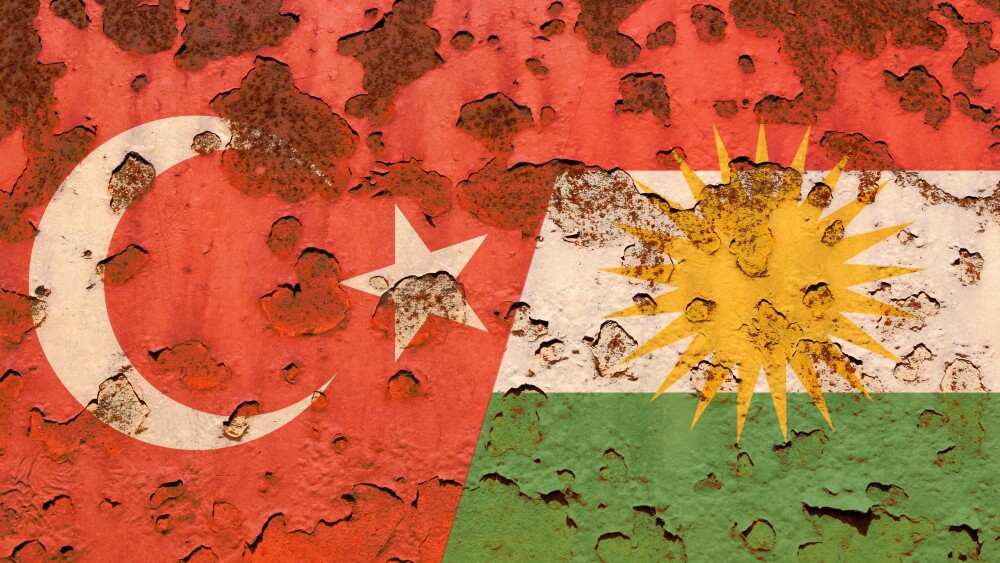Imagine tossing a pebble into a pond, and then watching as the ripples spread outward, their effects radiating through the still water far beyond where the stone initially splashed.
The fall of Damascus will have ramifications far beyond the city’s walls, as it would represent a significant blow to Kurdish autonomy and stability.
This describes the profound consequences of Israel’s military actions against Hezbollah, which have weakened the group’s military power and created a cascade of shifting dynamics in the Middle East. The most immediate result of Hezbollah’s diminished strength is the opening it has created for other extremist groups to regain ground. Remnants of ISIS, al-Qaeda, and Turkish-backed factions – most notably the terrorist group Hayat Tahrir al-Sham (HTS) and its ally, the so-called Syrian National Army (SNA), bearing the ISIS flag on their uniforms in Syria – seized the opportunity to advance further toward Damascus.
Now, the survival of two Kurdish-majority districts, Ashrafiye and Sheikh Maqsood, in Aleppo is at stake. These neighborhoods, controlled by the Kurdish Yekîneyên Parastina Gel (YPG) and Yekîneyên Parastina Jin (YPJ), have now become refuges for many Arabs displaced by the HTS offensive.
These two districts have already been hosting refugees who fled Turkey’s occupation of the city of Afrin in 2018. The Syrian Democratic Forces (SDF) have sent reinforcements to these districts to defend the people there. The fall of Damascus will have ramifications far beyond the city’s walls, as it would represent a significant blow to Kurdish autonomy and stability.
International volatility
Adding complexity to this volatile situation is Russia’s ongoing preoccupation with Ukraine. As Moscow focused its attention on the European front, it showed minimal interest in curbing Turkey’s growing influence in Syria, particularly its support for HTS. This hands-off approach from Russia, a key player in Syria’s conflict, has left a power vacuum that further destabilizes the region.
In this context, Israel’s 60-day ceasefire with Hezbollah has proved consequential. While the truce is brief, the blows to this Iranian proxy force have altered the military calculus in Syria. Hezbollah, once a critical supporter of Bashar Assad’s regime, was less able to provide that backing, emboldening opposition groups and shifting the balance of power toward the rebels and extremists.
WITH TURKEY’S military operations intensifying, there is growing concern over the future of Kurdish-held territories. With the fall of the Assad regime, the focus will likely shift to Kobani, a symbol of Kurdish resilience facing ISIS. Historically, Turkey has sought to expand its influence in Kobani, a city previously under siege by ISIS for 134 days before Kurdish forces, with US support, broke the blockade.
Now, Turkey’s military operations against Kurdish territories are gaining momentum once again, especially in Manbij, and are likely to intensify in anticipation of potential political changes in the US – with Donald Trump’s looming return to the presidency. Trump’s previous support for Turkish President Recep Tayyip Erdogan and his green light for Turkey to occupy portions of Rojava add yet another layer of unpredictability to the situation.
The new Turkish offensives could position Ankara as a more dominant player in Syria, potentially strengthening its hand in negotiations and regional influence.
Turkey’s increasing footprint in Syria signals an assertion of its strategic priorities.
This is a new phase since its failure to implement successful policies in Syria from the start of the civil war in 2011 may be evolving.
The new Turkish offensives could position Ankara as a more dominant player in Syria, potentially strengthening its hand in negotiations and regional influence. But this expansion comes at the expense of the Kurds, whose autonomous region of Rojava has been a beacon of hope and stability in a region torn by war and violence.
For the Kurds, any further erosion of their territorial integrity and political autonomy would weaken their position in the broader Middle East, likely setting back their aspirations for self-determination. Moreover, the growing Turkish military presence could fracture the relationship between Rojava and the Kurdistan Regional Government in Iraq, threatening the fragile unity that has existed between the two Kurdish entities.
ISRAEL TOO, will not remain unaffected by these shifting dynamics. The diminished military power of Hezbollah may have immediate benefits for Israel in terms of reducing the threat from Hezbollah’s military capabilities.
However, this change could lead to a more significant challenge. As Sunni extremist groups, bolstered by funding from Turkey and Qatar, come together, they may form a stronger, more coordinated alliance that poses a more formidable threat to Israel than the fragmented Shi’ite-based opposition it has faced until now.
If Turkey’s offensive is successful, it could infuse a new wave of energy into the extremist movements, further destabilizing the region and drawing more attention away from the previous focus on Shi’ite militias and Iran.
The broader geopolitical implications are clear. The shifting balance of power in Syria could lead to new alignments and rivalries. With its proxies crushed across Lebanon, Gaza, Syria, and Iraq, Iran’s influence has faltered.
However, Turkey’s abrupt moves could extend the region’s focus to new fronts. This could complicate US and Israeli efforts to maintain stability and security in the Middle East, particularly as Sunni extremist factions may now unite under the auspices of Turkish and Qatari influence.
The Kurds are there with significant potential, extending into Iraq; they are not just a local force but a reliable, battle-tested partner in building a truly secure region.
In such a volatile environment, the US and Israel must stay vigilant and capable of reassessing regional strategy in the face of these shifting tides. The ripple effect brings unintended consequences, opening new fronts that could present new challenges with broader implications for Western interests. This resurgence, ISIS 2.0, threatens to exploit the power vacuum left behind, amplifying instability and escalating violence.
The stakes are high, and the actions of key players in the Middle East will shape the trajectory of future conflicts and alliances, with profound implications for the West. Amid these shifting dynamics, the Kurds are there with significant potential, extending into Iraq; they are not just a local force but a reliable, battle-tested partner in building a truly secure region.
Their unwavering dedication, proven resilience, and expertise in managing security challenges, coupled with their leadership in addressing regional crises, reaffirm their indispensable role in the pursuit of lasting peace and stability across the region.
The Middle East remains as unpredictable as ever, and the ripples caused by Israel’s actions against Hezbollah may just be the beginning of a much larger and more complex shift in the region’s power dynamics. The ripples following Biden’s brokered truce should not be celebrated as it could grow into a tidal wave.
Published originally under the title “Hezbollah Weakened: Ripple Effects Reshape Middle East Geopolitics.”








